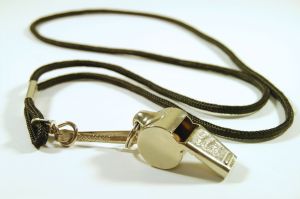 Two federal laws regulate referrals and financial arrangements between healthcare providers and facilities – Stark Law and the Anti-Kickback Statute.1 These laws have recently been at the center of important healthcare whistleblower fraud cases. While both serve the same essential purpose – to eliminate improper financial incentives that interfere with independent medical judgment and good patient care – they do so in slightly different ways and contexts.
Two federal laws regulate referrals and financial arrangements between healthcare providers and facilities – Stark Law and the Anti-Kickback Statute.1 These laws have recently been at the center of important healthcare whistleblower fraud cases. While both serve the same essential purpose – to eliminate improper financial incentives that interfere with independent medical judgment and good patient care – they do so in slightly different ways and contexts.
Stark Law (also known as the “Ethics in Patient Referrals Act”) prohibits physician referrals of specified or “designated health services” for Medicare and Medicaid patients, where the physician or her immediate family member has a financial relationship with the referred entity.2 A financial relationship can include ownership, investment interest, and direct or indirect compensation arrangements.3 A “referral” is broadly defined to include “the request by a physician for the item or service” (Medicare Part B services) and “the request or establishment of a plan of care by a physician which includes the provision of the designated health service” (all other services).4 Designated health services (DHS) include laboratory services, physical therapy and occupational services, radiology (including MRI, ultrasound, and computer tomography scan) services, radiation therapy services and supplies, durable medical equipment and supplies, prosthetics, orthotics, and prosthetic devices, home health services and supplies, outpatient prescription drugs, and inpatient and outpatient hospital services.5
Continue reading ›
 Total Health Law Blog
Total Health Law Blog


 Controlling healthcare costs is essential to the economic security of the United States. Total healthcare spending in the U.S., already an astronomical $3 trillion dollars in 2013, is expected to grow almost 6% annually through 2022.1 Spiraling healthcare costs is an obvious problem on many levels, including the fact that, through Medicare, the federal government is the single largest purchaser of healthcare in our third party payer system. Total Medicare spending is expected to increase from $523 billion in 2010 to $932 billion by 2020.2
Controlling healthcare costs is essential to the economic security of the United States. Total healthcare spending in the U.S., already an astronomical $3 trillion dollars in 2013, is expected to grow almost 6% annually through 2022.1 Spiraling healthcare costs is an obvious problem on many levels, including the fact that, through Medicare, the federal government is the single largest purchaser of healthcare in our third party payer system. Total Medicare spending is expected to increase from $523 billion in 2010 to $932 billion by 2020.2 Halifax Hospital Medical Center and Halifax Staffing, Inc. (Halifax), on the day of jury selection, agreed to pay $85 million and made other concessions as part of a settlement with the federal government to resolve allegations that Halifax violated STARK prohibitions and the False Claims Act (FCA). The settlement amount is the largest STARK sanction to date against a hospital system for STARK law violations.
Halifax Hospital Medical Center and Halifax Staffing, Inc. (Halifax), on the day of jury selection, agreed to pay $85 million and made other concessions as part of a settlement with the federal government to resolve allegations that Halifax violated STARK prohibitions and the False Claims Act (FCA). The settlement amount is the largest STARK sanction to date against a hospital system for STARK law violations. On September 5, 2013, owners of Trust Care Health Services, Inc. (Trust Care) pled guilty in a Florida federal court to federal healthcare fraud charges. Roberto Marrero, Sandra Fernandez and Enrique Rodriguez, owned and operated Trust Care. Trust Care was a Florida corporation, incorporated in 2005 that did business as a home healthcare services business in the Miami and South Florida area. Trust Care provided home health and physical therapy services to Medicare beneficiaries.
On September 5, 2013, owners of Trust Care Health Services, Inc. (Trust Care) pled guilty in a Florida federal court to federal healthcare fraud charges. Roberto Marrero, Sandra Fernandez and Enrique Rodriguez, owned and operated Trust Care. Trust Care was a Florida corporation, incorporated in 2005 that did business as a home healthcare services business in the Miami and South Florida area. Trust Care provided home health and physical therapy services to Medicare beneficiaries.  The Medicare Strike Force of the FBI and HHS-OIG continues
The Medicare Strike Force of the FBI and HHS-OIG continues  On January 15, 2013, Dr. Joel I. Bertstein, a La Jolla, California oncologist, pled guilty to a charge that he introduced an unapproved drug into interstate commerce and administering it to patients. The drug is a cancer fighting drug known as “Mabthera.” Mabthera has not been approved by the U.S. Food and Drug Administration (FDA) for use in the United States and is intended for marketing in Turkey. Rituxa is the approved U.S. drug that contains the same active ingredient and is used to fight lymphomas and leukemias.
On January 15, 2013, Dr. Joel I. Bertstein, a La Jolla, California oncologist, pled guilty to a charge that he introduced an unapproved drug into interstate commerce and administering it to patients. The drug is a cancer fighting drug known as “Mabthera.” Mabthera has not been approved by the U.S. Food and Drug Administration (FDA) for use in the United States and is intended for marketing in Turkey. Rituxa is the approved U.S. drug that contains the same active ingredient and is used to fight lymphomas and leukemias.  Federal law enforcement agents arrested one Chicago-area resident and six Detroit-area residents based on allegations of home health care fraud. In an 18-count indictment unsealed on January 17, 2013, the federal government contends that the seven parties effectuated a scheme to defraud Medicare based on claims for in-home health services at Royal Home Health Care Inc., Prestige Home Health Care Services Inc., Platinum Home Health Services Inc. and Empirical Home Health Care Services Inc. According to the indictment, Medicare was defrauded of over $22 million based on false claims for services since August 2008.
Federal law enforcement agents arrested one Chicago-area resident and six Detroit-area residents based on allegations of home health care fraud. In an 18-count indictment unsealed on January 17, 2013, the federal government contends that the seven parties effectuated a scheme to defraud Medicare based on claims for in-home health services at Royal Home Health Care Inc., Prestige Home Health Care Services Inc., Platinum Home Health Services Inc. and Empirical Home Health Care Services Inc. According to the indictment, Medicare was defrauded of over $22 million based on false claims for services since August 2008.